Culture of United Kingdom
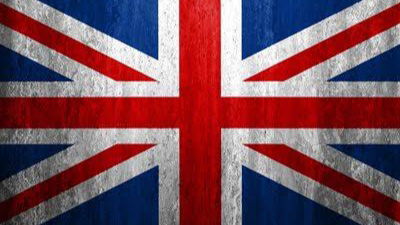
Culture Name
British
Alternative Name
Formally known as the United Kingdom of Great Britain and Northern Ireland
Orientation
Identification. The United Kingdom of Great Britain and Northern Ireland is the formal name of the sovereign state governed by Parliament in London. The term "United Kingdom" normally is understood to include Northern Ireland; the term "Great Britain" refers to the island of Britain and its constituent nations of England, Wales, and Scotland but does not include Northern Ireland. Any citizen of Great Britain may be referred to as a Briton.
Location and Geography. The land area of Great Britain is 89,000 square miles (230,500 square kilometers), with an additional 5,400 square miles (13,986 square kilometers) in Northern Ireland, giving it one of the highest population densities in the Western world. Although the country lies mostly at the latitude of Labrador in the western Atlantic, the climate is tempered by the Gulf Stream and does not have extremes of summer heat or winter cold. Except for some areas of barren upland and bog, most of the land is suitable for agriculture and has been grazed or cultivated since the Bronze Age. The natural vegetation is mixed oak woodland, but most of the terrain has been cleared for agriculture or for shipbuilding and charcoal for smelting. The earliest evidence of human settlement is at Boxgrove, Sussex, and the island may have been continuously occupied for 500,000 years.
Demography. The population is approximately 55 million: 46 million in England, 5 million in Scotland, 2.5 million in Wales, and 1.5 million in Northern Ireland.
The nation's cultural diversity has been increased by migration within the British Isles and by immigration from Europe and overseas. Until 1920, Ireland was incorporated within the United Kingdom. Movement across the Irish Sea had existed since the eighteenth century, even among Ireland's poorest people. In the nineteenth century, there was a regular pattern of seasonal migration of farm workers from Ireland to Britain. Irishmen volunteered for the Royal Navy and British Army regiments in the eighteenth and nineteenth centuries and saw service in all parts of the empire. A wide variety of other Irish people spent periods in Britain, which had a more highly developed economy than Ireland. From 1841 onward, the censuses of Scotland, England, and Wales have enumerated Irish-born people in every part of the country. Similarly, Scottish and Welsh people have settled in England. Most British people have ancestries that are mixtures of the four nationalities of the British Isles.
Before and after World War II, political and religious refugees and displaced persons from the Baltic countries, Poland, Czechoslovakia, and Hungary were offered shelter in Britain and remained, along with some prisoners of war. Other immigrants of European ancestry who were born in Canada, New Zealand, Australia, and South and East Africa, along with Greek and Turkish Cypriots, also settled in Britain. After the late 1940s, many of non-European overseas immigrants arrived, predominantly from the colonies, including people of Indian and African ancestry from the West Indies and Guyana; people from India, Pakistan and Bangladesh; and Chinese from Hong Kong and Singapore. The 1991 census, the first to include ethnic background, enumerated three million Britons of non-European birth or ancestry.
Linguistic Affiliation. Regional and cultural relationships are expressed in marked linguistic differences. Although the language has been modified by a gradual convergence toward "estuary English" a
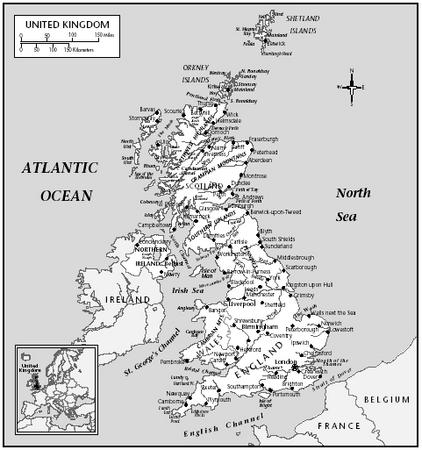
United Kingdom
less formal variety of southeastern speech, and educational and socioeconomic factors, it is possible to determine people's geographical origins by the way they speak. In some areas, there are significant differences in speech patterns from one city or county to its neighbor. These differences are associated with loyalties to one's place of birth or residence and for many people are important aspects of self-identity; non-English native languages are little spoken but in recent years have gained significance as cultural and political symbols. These languages include Scots Gaelic, Welsh, Cornish, and Irish (commonly referred to as the Celtic languages); there is also the Old Norse language of the Northern Isles (Orkney and especially Shetland) and the Norman French patois of the Channel Islands. In Wales, 80 percent of the people speak English as their first or only language and those who speak Welsh as their first language are bilingual. In Scotland, Gaelic is not a national symbol because it was never spoken in some parts of that country. People in the Northern Isles are bilingual in English and an unwritten creolized form of Old Norse; in the Channel Islands, the Norman French patois is nearly extinct; and in Cornwall, there are no natural speakers of Cornish, although the language has been reconstructed. In Northern Ireland, the Irish language has been reintroduced as a means of revitalizing Celtic pride among Belfast Catholics.
Symbolism. Symbolic attachment may reinforce localism or take the form of personal commitments that extend across socioeconomic strata. Support for soccer and rugby teams became significant during the twentieth century, and teams now command fierce local loyalties as sport has come to symbolize male pride and self-image in a society where mining and manufacturing have declined. Forms of personal commitment that transcend locality include vegetarianism and environmentalism: the first is predominantly middle class and female, and the second is identified less with gender and socioeconomic status. On the fringes of society, especially among the young, there has been a significant growth in new religious movements, which include radical environmentalist cults, New Age paganism, anarchism, anticapitalist and antinuclear groups, and adopted Far Eastern and South Asian religions and belief systems, including martial arts cults. Cults based on popular music and performers engender personal commitment in culturally patterned ways.
History and Ethnic Relations
Emergence of the Nation. The United Kingdom was formed by Acts of Union between England and Wales (1536) and England, Wales, and Scotland (1707), uniting the three nations under a single monarchy and legislative council (Parliament in London). After 1169, the island of Ireland came under British influence, and it became a colonial dependency in 1690. The British and Irish parliaments were united in 1801. A separatist movement led to the dissolution of the Union of Great Britain and Ireland in 1920; twenty-six of Ireland's thirty-two counties became the independent Irish Free State (later the Republic of Ireland), with six of the nine counties of Ulster remaining within the United Kingdom. The present-day nation also includes the Channel Islands off the coast of France and the Isle of Man between Britain and Ireland, which are substantially self-governing. Northern Ireland and Scotland have separate legal and educational systems and issue their own currency; Wales is fully incorporated within the English legal, educational, and banking systems. Recent referendums in Scotland and Wales have resulted in the establishment of a Scottish Parliament which is still under the general jurisdiction of London but has limited local taxraising powers, and the Welsh Assembly, which does not have tax-raising powers.
The native tribes in the central and eastern parts of England were conquered by the Romans in 55 B.C.E. , and permanent Roman settlements were established in 43 B.C.E. and continued for four hundred years. The numbers of Romans were never great, but the indigenous upper classes became Romanized and spoke Latin. The principal Roman towns had baths, temples, amphitheaters, and forums and some of the roads designed to connect Roman towns are still in use. With the departure of the Romans, the British Isles were invaded by a succession of warlike peoples from the European mainland, including the Angles, Saxons, and Jutes; there were also persistent Danish raids. All migrations influenced the native Britons, as can be seen in the English language, which is an amalgam of the languages spoken by the waves of colonists. This turbulence ended with the Norman Conquest in 1066. A new line of kings attempted to extend control into the farthest reaches of Wales, Scotland, and Ireland, and struggles for supremacy between rival chieftains and princes culminated in the Magna Carta of 1215, which eventually led to the establishment of Parliament and representative democracy. A period of consensus and stability followed the accession to the throne of the Tudor king Henry VII in 1495. His successor, Henry VIII, broke with the Catholic church in Rome and declared himself the head of the Church of England. The dissolution of the monasteries and the confiscation of the property of the Roman Catholic church occurred during the Reformation, leading to challenges to the monarchy by rivals who supported Catholicism. Instability, civil unrest, and competition with other European powers over claims to overseas territory continued for much of the seventeenth century.
Commerce and manufacturing (principally the domestic woolen and Newfoundland and Boston salt-fish trades) developed rapidly, and the authority of Parliament over the monarchy was consolidated by the beginning of the eighteenth century. Capitalism existed before the Industrial Revolution, but its development was hampered by technologies limited to water power and a lack of surplus labor. During the period of the Enclosures (1740–1789),
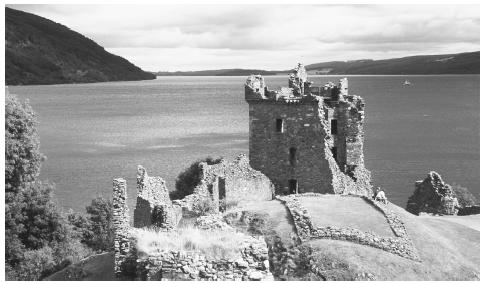
A castle overlooks the water in Scotland. Castles dot the countryside in all parts of the United Kingdom.
landlords cleared the peasantry from the rural landscape to create fields enclosed by hedgerows and fences and began to derive profit from new, scientific methods of intensive agricultural production rather than relying the meager tithes and rents paid by peasant smallholders. This displaced large numbers of rural people, who were forced to emigrate to the overseas colonies or migrate to the new sites of industrial production.
The impetus for the Industrial Revolution came from trade with the expanding colonies by a growing middle class of entrepreneurs and investors whose wealth was not derived from land but from commerce; those entrepreneurs reinvested their wealth in new forms of manufacturing and trade rather than in ways that imitated the consumption patterns of the landed gentry. The Industrial Revolution began at the end of the seventeenth century, specifically in the machine-driven manufacturing processes made possible by the steam engine, which was first used in 1698 to draw water from an underground tin mine, and then was adapted to drive power looms in textile mills. Overseas colonization and wars with other European powers stimulated the further development of mining and metallurgy, precision machine tools, navigational instruments, cartography, and managerial and logistical organization, which were exploited for commercial gain by private entrepreneurs. By 1815, Britain had the world's largest and most powerful navy, and within twenty years steam railways and steam-powered ships designed by British engineers were carrying passengers and cargo for profit, allowing British shipping companies to dominate world trade. By midcentury, the country was the world's leading power in business and finance, engineering, science, and medicine.
The Industrial Revolution created a new social order as entrepreneurship and factory production resulted in new forms of wealth and work that were added to the agrarian social order dominated by aristocratic landowners. The 1832 Reform Act ended the political privileges of landed wealth by extending the vote to middle-class male heads of household. The country would be governed by the beliefs, values, and aspirations of the middle class rather than by those of the landed aristocracy. One dimension of this new social order was urbanization: as dispersed cottage industries such as weaving were replaced by mills in central locations, nearby housing was needed for the workers; that housing frequently was built by the mill owner and rented to the workers. The populations of Glasgow, Manchester, Liverpool, and Birmingham doubled or tripled between 1801 and 1841, and many major towns and cities grew up around mines, mills, smelting works, ports and railway junctions.
Work in the "dark, satanic mills" brought new levels of exploitation and hardship. Rapid industrialization caused overcrowding and disease; cholera epidemics between the 1830s and 1860s provoked public unrest and forced the government to improve public health. Another consequence of Victorian working conditions was the rise of trade unionism. A socially stratified and politically divided society, that was preoccupied with distinctions of social class and the rival ideologies of laissez-faire capitalism and state socialism soon crystallized.
Until the middle of the twentieth century, the United Kingdom was one of the world's wealthiest and most influential nations. Machine tools, locomotives, and steamships built in Scotland and the industrial Midlands were exported worldwide; textile products from Lancashire, Staffordshire china and pottery, Welsh anthracite coal, and finished steel products from Sheffield, dominated world markets for a century. British mining, manufacturing, transportation technology; legal, banking and parliamentary systems; and scientific discoveries and advances were exported worldwide. The nation's wealth was further underwritten by its position as the chief European colonial power, with captive markets and extensive sources of cheap labor and raw materials in Australasia, Asia, Africa, and the Americas. The country's position as a world power was reduced in the second half of the twentieth century by two world wars and the gradual decline of its advantages in manufacturing and business, the loss of the empire, and expensive experiments with state socialism. By the late 1970s, the nation was in debt to the International Monetary Fund. The discovery of oil in the North Sea in the 1970s saved the country from bankruptcy and stimulated economic recovery. Tax revenues from the oil industry provided the means to restructure the economy away from an obsolescent manufacturing base and toward a base dominated by service and knowledge-based industries.
National Identity. The United Kingdom is made up of four interdependent nations with many common institutions. While differences in everyday modes of sociality and consumer behavior are not great from one part of the nation to another, some aspects of culture are symbolic of national or local difference on the level of everyday practice or on special occasions. Support for the monarchy, political parties, and soccer teams are the most obvious expressions of contemporary localism; religious adherence and ethnic differentiation are also significant. Support for the monarchy and the Conservative Party is highest in England, especially in the south, while in Scotland and Wales it is substantially lower. In Scotland and Wales, there are minority nationalist parties. The Scottish National Party's political program is dominated by economic issues, particularly tax revenues from North Sea oil. The political agenda of Plaid Cymru, the Welsh nationalist party, is mainly concerned with linguistic and cultural matters. In both Scotland and Wales, the Labour Party is dominant, drawing strength from its critique of the class privilege traditionally associated with London and southeastern England. The dominance of the Labour Party in much of Wales and Scotland provides conditions for patronage-style politics.
Ethnic Relations. A high degree of spatial integration is generally held to be indicative of social integration, assimilation, and acculturation, while spatial segregation is indicative of social pluralism. Non-European immigration in Britain has not moved toward a pattern of sharply-defined urban ethnic ghettoes. Nevertheless, many non-European immigrants continue to be subject to discriminatory practices in employment and in other spheres, even if systematic marginalization cannot be inferred from their spatial distribution within the towns and cities of the nation.
Urbanism, Architecture, and the Use of Space
Rights to land development were in effect nationalized in 1947 by an act of Parliament that removed the right of the owner of a piece of property to change its use and transferred that power to the state. By the end of the twentieth century, 80 percent of the land area was reserved for agricultural use but was responsible for less than 5 percent of the gross national product and less than 2 percent of employment, yet the land-use planning system has continued to grow in size and power. Speculating in land is big business, and the amount of land available for housing is so restricted that any house within commuting range of a job will command a high price.
The countryside is increasingly seen as an aesthetic and recreational resource for people who live in the towns and cities. However, this image of the countryside is very expensive to maintain. The population is crowded together in towns on tiny plots of land, while much of the open land is underpopulated and underused. Many people in small
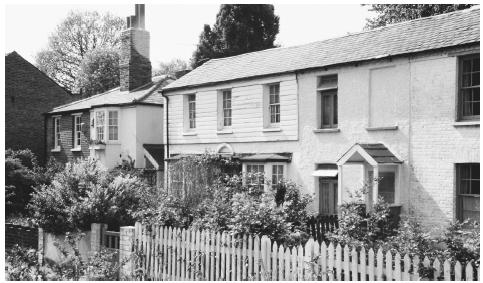
Cottages in Walthamstow Village, London, England. Housing in or near the cities is in very high demand.
urban houses have high mortgages because of the cost of land.
Food and Economy
Basic Economy. The United Kingdom has one of the largest economies in the world, with a Gross National Product estimate in 1999 at $1.29 trillion (U.S.). Finance, manufacturing, and trade form the base of the economy. The pound sterling is the currency, and it is still being debated whether the nation will join with the its European Union partners and adopt the Euro.
Commercial Activities. Banking and finance, including insurance, are mainstays of the economy.
Major Industries. The United Kingdom is one of the most industrialized nations on earth and has a strong manufacturing base. Major products include machine tools, aircraft and ships, motor vehicles, electronics, chemicals, coal, petroleum, textiles, and food processing.
Trade. One of the leading trading powers in the world, the United Kingdom exported $271 billion (U.S.) and imported $306 billion (U.S.) worth of goods in 1998. Chief exports include manufactured goods, food, chemicals, and fuels. Manufactured goods, machinery, fuel, and food products are imported. Primary trading partners are the European Union and the United States.
Division of Labor. Although the nation produces almost two-thirds of its food needs, in 1998, agriculture accounted for less than 2 percent of the workforce sector. Services account for 73 percent, and industry another 25.3 percent.
Social Stratification
Classes and Castes. The idea of social class is much more powerful than that of ethnicity. People frequently characterize themselves as working class or middle class. Although few admit to being upper class, in principle there are three classes, with the highest one reserved for the aristocratic inheritors of old, landed wealth. The term "social class" has complex meanings with social, economic, and political dimensions. People who describe themselves as working class perceive themselves to have respectable but unprivileged origins, and typically are born into a family supported by wages from industrial or agricultural labor paid in cash at the end of the week. In these families neither parent has a college degree and the housing that the family occupies is rented. There is a strong association between the idea of being working class and supportive of the
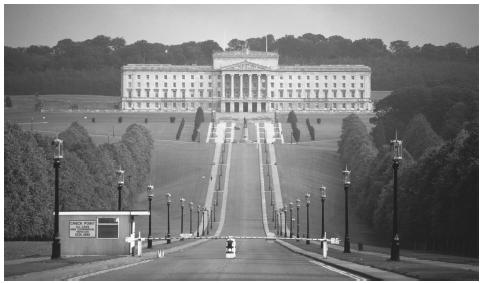
Wide open grounds surround Belfast's Northern Ireland Parliament Building for security reasons.
trade union movement and the Labour Party; the identification thus is with a set of corporate or collective economic, social, and political interests and aspirations. A self-described middle-class person has a social background and political attitudes that suggest parents with white-collar jobs whose salaries are paid monthly by check and who are likely to have professional or advanced education, to live in an owner-occupied suburban house, and to have made strategic choices about their children's education. They are likely to use their education and social skills for upward economic mobility and to support the Conservative Party, which stresses self-sufficiency and individualism. These differences have never been as clear-cut as the rhetoric of the main political parties and professional critics of the social order have asserted. The concept of class has recently fallen out of favor with politicians and sociologists as the nation's social and economic structure has changed dramatically with deindustrialization and the growth of social mobility and the knowledge economy.
Political Life
Government. The United Kingdom is a constitutional monarchy. The monarch is chief of state and the prime minister is head of government. The Cabinet of Ministers is appointed by the prime minister and are responsible to Parliament. Parliament is composed of the House of Lords (hereditary), the House of Commons (elected), and the sovereign.
Leadership and Political Officials. The monarch reigns, but does not rule the nation per se, acting only with the approval of Parliament. The prime minister holds the executive power and is traditionally the leader of the majority party in Parliament. The primary parties are the Labour Party, the Conservative Party, and the Liberal Democrats.
Social Problems and Control. Each of the countries within the United Kingdom has its own judicial system and courts.
Military Activity. The United Kingdom has a strong military, with an army, the Royal Navy, and the Royal Air Force. The nation is an active participant in the North Atlantic Treaty Organization (NATO).
Social Welfare and Change Programs
The National Insurance, in operation since 1948, provides medical, unemployment, maternity, and retirement benefits, among others. Employers and employees contribute to this fund. The National
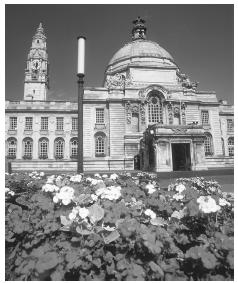
City Hall in Cardiff, Wales.
Assistance Board provides financial assistance to the poor.
Gender Roles and Statuses
The Relative Status of Women and Men. In the 1970s, there were national debates on the changing role of women in society and their women's employment prospects. By the 1980s, the debate had shifted to the implications of the increasing participation of women as the economy was restructured and the balance changed from manufacturing to service occupations. In the 1990s, national debates concentrated on the relationship between work, family life, consumption levels, and the socialization and education of the next generation. Approximately half of British women work; of these, half are part-time workers. Nevertheless, a significant gender divide persists in regard to suitable occupations for men and women, access to occupations by women and men, pay levels for similar kinds of work, and the allocation of domestic tasks. Although the ideal of gender equality is widely shared, social behavior lags behind the ideal. For example, 75 percent of couples say that the preparation of the evening meal should be shared equally, but only one-third of these couples live up to that ideal.
Marriage, Family, and Kinship
Marriage. Premarital sex and unmarried cohabitation are widely accepted even if they are not liked by defenders of traditional family values. Single motherhood caused by unstable cohabiting relationships or marital breakdown is perceived as a major problem because of its impact on the welfare budget rather than as a moral question. Nonetheless, family relationships remain close. Roughly 70 percent of adults live within an hour's journey of their parents or grown-up children, and nearly half see their mothers, fathers, adult children, and best friends at least once a week. While newspaper and television reports claim that the nuclear family is in decline because of increased rates of unmarried cohabitation and divorce, personal commitment to kinship ties has not changed much. Seventy percent of adults think that people should keep in touch with close family members; 55 percent think that they should keep in touch with relatives such as uncles, aunts, and cousins; 60 percent say that they would rather spend time with relatives than with friends; and nearly 80 percent think relatives are more important than friends. These attitudes vary with age and gender—people over age forty-five tend to be more family-centered than are younger people.
Kin Groups. Family life is changing, and there are tensions between kinship ties and some contemporary social values. However, the great majority of people perceive themselves to be part of multigenerational families and regard these relationships as very important.
Etiquette
The United Kingdom is a crowded country. People cope with this situation by being reserved and diffident in public, politely ignoring strangers, quietly minding their own business, and marking out and defending their private spaces, homes, and gardens. They expect others to do the same.
Religion
Religious Beliefs. Since the 1950s, church adherence has fallen dramatically, and the British are generally uninterested in formal religious practice. Sixty percent of adults do not believe in God, and one-third have no religious affiliation. Thirty-six percent of the population identifies with the official, state-sanctioned Church of England; 10 percent with the Roman Catholic Church; 4 percent with Presbyterianism; 4 percent with Baptism and Methodism; 3 percent with other Protestant denominations, and 3 percent with other religions. Four percent describe themselves as Christians, and 35 percent say that they have no religion. Geographically, the Church of England is represented as the Church of England, the Church of Scotland, the Church of Ireland, and the Church in Wales, but Anglicanism is the predominant church mainly in England. In Wales, there was a strong nonconformist presence of Methodist and Baptist chapels whose importance in local life has declined considerably since 1950; in Scotland and Northern Ireland, Presbyterianism is strongly represented; and Roman Catholicism is significant in Northern Ireland, the Western Isles of Scotland, parts of Lancashire and Sussex, and cities where large numbers of nineteenth century Irish Catholic immigrants settled. Only in Northern Ireland is religion strongly identified with political aspirations.
Medicine and Health Care
The National Health Service, which was set up by an act of Parliament in 1947, gave every resident access to free medical care. A system was created that operated local public hospitals throughout the country and directly employed doctors, nurses, and other health workers. Family doctors, specialists, and dentists also received payment from the government for treating patients, although any doctor or patient can practice privately or pay for private medical care. There have been continuing debates on the level of care the service should provide and how it should be funded. The system was intended to provide unlimited medical care to any patient, and the government undertook to pay the full cost. In some ways, the service has been a victim of its own success. Free medical care and successful efforts to promote better health, diet, and working conditions have meant that people live much longer. The care of the frail elderly has consumed an increasing amount of resources; as have advances in treating diseases. Governments' attempts to control the costs of health care inevitably result in the covert rationing of resources, which conflicts with the principle of the citizen's right to high-quality free care when it is needed.
Secular Celebrations
The Celebration of the Birthday of the Queen is held on the second Saturday in June. Other legal holidays include New Year's Day, Good Friday, Late Summer Holiday (the last Monday in August or the first in September), Christmas Day, and Boxing Day (26 December). Scotland and Northern Ireland, celebrate several of their own holidays.
Bibliography
Baumann, Gerd. Contesting Culture: Discourses of Identity in Multi-Ethnic London, 1996.
Bell, Colin. Middle-Class Families, 1969.
Boyce, D. George. The Irish Question and British Politics, 1868–1996, 2nd ed., 1996.
British Social Attitudes, annual editions.
Bruce, Steve. The Edge of the Union: The Ulster Loyalist Political Vision, 1994.
Byron, Reginald. Irish America, 1999.
Chapman, Malcolm. The Gaelic Vision in Scottish Culture 1978.
——. The Celts: The Construction of a Myth, 1992.
Charsley, Simon. Rites of Marrying: A Scottish Study, 1991.
Clancy, Patrick, Sheelagh Drudy, Kathleen Lynch, and Liam O'Dowd, eds. Ireland: A Sociological Profile 1986.
Cohen, Anthony, ed. Belonging: Identity and Social Organisation in British Rural Cultures, 1982.
Colls, Robert, and Philip Dodd, eds. Englishness: Politics and Culture, 1880–1920, 1986.
Davies, Charlotte. Welsh Nationalism in the Twentieth Century, 1989.
Davis, Graham. The Irish in Britain, 1815–1914, 1991.
Dennis, Norman, Fernando Henriques, and Clifford Slaughter. Coal is Our Life: An Analysis of a Yorkshire Mining Community, 2nd ed., 1969.
Fenton, Alexander. The Northern Isles: Orkney and Shetland, 1978.
——. Country Life in Scotland: Our Rural Past, 1987.
Finnegan, Ruth. The Hidden Musicians: Music-Making in an English Town, 1989.
Firth, Raymond, Jane Hubert, and Anthony Forge. Families and their Relatives, 1969.
Frankenberg, Ronald. Village on the Border: A Study of Religion, Politics and Football in a North Wales Community, 1990.
Goldthorpe, John. Social Mobility and Class Structure in Modern Britain, 2nd ed., 1987.
——. Family Life in Western Societies: A Historical Sociology of the Family in Britain and North America, 1987.
Gmelch, George. Double Passage: The Lives of Caribbean Migrants at Home and Abroad, 1992.
Harris, C. C. Redundancy and Recession in South Wales, 1987.
——. Family, Economy and Community, 1990.
Jenkins, Richard, ed. Northern Ireland: Studies in Social and Economic Life, 1989.
Macdonald, Sharon. Reimagining Culture: Histories, Identities, and the Gaelic Renaissance, 1997.
Macfarlane, Alan. The Origins of English Individualism, 1978.
——. The Culture of Capitalism, 1987.
Newby, Howard. Green and Pleasant Land? Social Change in Rural England, 1979.
Pahl, R. E., ed. Patterns of Urban Life, 1970.
Parman, Susan. Scottish Crofters: A Historical Ethnography of a Scottish Village, 1990.
Radcliffe, Peter. Ethnicity in the 1991 Census, vol. 3, 1996.
Rees, Alwyn. Celtic Heritage: Ancient Tradition in Ireland and Wales, 1961.
——. Life in a Welsh Countryside, 1996.
Review of Scottish Culture, annual editions.
Sampson, Anthony. The Changing Anatomy of Britain, 1982.
Short, Brian. The English Rural Community: Images and Analysis, 1992.
Social Trends, annual editions.
Stanworth, Philip, and Anthony Giddens. Elites and Power in British Society, 1974.
Strathern, Marilyn. Kinship at the Core, 1981.
Thompson, E. P. The Making of the English Working Class, 2nd ed., 1980.
——. Customs in Common, 1991.
Tunstall, Jeremy. The Fishermen: The Sociology of an Extreme Occupation, 1962.
Wallman, Sandra. Eight London Households, 1984.
